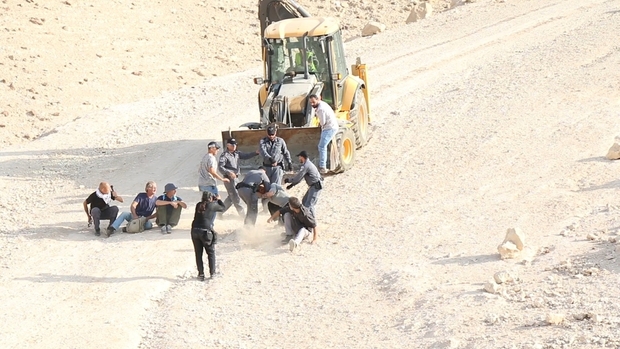Israeli forces along with at least three bulldozers and other heavy equipment have entered the Palestinian village of Khan Al-Ahmar for the second consecutive day on Tuesday morning. The village has been under the constant threat of demolition since the deadline of October 1, set by Israeli authorities for the village residents to demolish and vacate their homes, expired 16 days ago. An Israeli court had earlier given its approval for the demolition of the village on September 5, this year.
When the Israelis had arrived at the village accompanied by the bulldozers on Monday, it faced massive resistance from Palestinians, who were supported by many Israeli and other foreign pro-Palestine activists. Seven people received injuries and four were arrested for a short time, following the clashes.
Meanwhile, the Prosecutor at International Criminal Court (ICC) Fatou Bensouda warned that “it will not hesitate to take appropriate action” if Israel goes ahead with the demolition.
Bensouda said that “it bears recalling, as a general matter, that extensive destruction of property without military necessity and population transfers in an occupied territory constitute war crimes under the Rome Statute”.
The village of Khan Al-Ahmar is home to approximately 35 families, comprising of close to 200 Palestinian Bedouin villagers belonging to the Jahalin tribe, who have lived in the area since 1948, after the establishment of Israel, which resulted in their displacement and expulsion from their native lands and homes in the Negev desert. The villagers mostly live in makeshift tents and shacks.
The Israeli government plans to relocate the villagers to an area near a sewage treatment facility near the Dead Sea, or about 12 kilometres away, near a landfill close to the village of Abu Dis. Human rights groups and international organisations have warned that a forcible relocation of the villagers would violate international law and would effectively be a war crime.
Khan Al-Ahmar falls under Israeli civil and security administration according to the Oslo Accords, since it is located inside Area C, on the eastern desert hillside of Jerusalem, next to an Israeli highway leading up to the Dead Sea. By demolishing the village, the Israelis plan to construct housing units that would eventually connect the illegal Jewish settlements of Kfar Adumim and Maale Adumim with East Jerusalem. This would also result in the West Bank being cut into half.
Building settlement inside the occupied territories is considered to be war crimes under Geneva convention and other international law instruments.
Israel’s Supreme Court has twice, on May 24 and September 5, ruled in favour of demolishing the village, reasoning that it was built without obtaining prior Israeli permission. Palestinians have retorted by saying that Israeli construction permits are impossible to obtain for Palestinians.
Sequence of Events
Earlier on Monday, a water pipe belonging to the Israeli National water company Mekerot had burst, forming a large pool of water and blocking the path to the village for the planned demolition. Middle East Eye reported that around 50 Israeli police and border police officers had arrived in Khan Al-Ahmar at around 7-8 am on Monday with at least three bulldozers. They were seen attempting to clear the water from the area. Palestinian and left-wing Israeli activists jumped into the pool of water in front of one of the bulldozers to stop it. Israeli forces later arrested one of the activists.
Israeli forces used violence against Palestinians in other areas of the village when the activists tried to prevent the Israeli officers from entering the village. According to the Palestinian health ministry, five people were injured in these clashes. Israeli forces also did not let medical vans to enter the village and medical officials were forced to walk barefoot to attend to the wounded.
Israeli forces had also arrested Palestinian activist Reyad Salahat, Israeli activists Jonathan Pollak and Kobi Snitz, and Dutch activist Robin Licker on Monday morning. On Monday afternoon, Licker, in a Facebook post, said that Pollak and Snitz had been released with him, while the lone Palestinian activist among those arrested was still in custody. Pollak and Salahat both also received injuries at the hands of the Israelis during their arrest.





